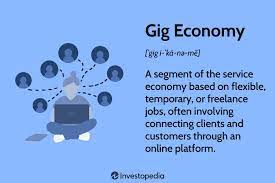The gig economy has revolutionized the way people work, offering flexibility and independence. However, for entrepreneurs navigating this dynamic landscape, financial planning becomes paramount. This article explores essential financial strategies for entrepreneurs in the gig economy, ensuring stability, growth, and long-term success.
I. Introduction
A. The Rise of the Gig Economy
The gig economy, characterized by short-term and freelance work, has created opportunities for entrepreneurs to leverage their skills and talents independently. Effective financial planning is crucial to navigate the uncertainties and capitalize on the benefits of this evolving work environment.
B. Unique Financial Challenges
Entrepreneurs in the gig economy face unique financial challenges, including irregular income, self-employment taxes, and the absence of traditional employee benefits. Tailoring financial strategies to address these challenges is key for sustainable entrepreneurship.
II. Establishing a Solid Financial Foundation
A. Separate Personal and Business Finances
Creating a clear distinction between personal and business finances is foundational. Open a dedicated business bank account, track income and expenses meticulously, and avoid commingling funds to maintain financial clarity.
B. Build an Emergency Fund
Given the fluctuating nature of gig income, establishing an emergency fund is essential. Aim for three to six months’ worth of living expenses to provide a financial safety net during lean periods.
III. Budgeting and Expense Management
A. Create a Realistic Budget
Developing a detailed budget helps entrepreneurs understand their financial obligations and allocate resources efficiently. Consider variable income when crafting the budget to accommodate fluctuations.
B. Prioritize Essential Expenses
Identify and prioritize essential expenses, including taxes, insurance, and necessary business tools. Allocate resources to cover these commitments before considering discretionary spending.
IV. Tax Planning and Compliance
A. Understand Tax Obligations
Entrepreneurs in the gig economy are responsible for their own taxes. Familiarize yourself with self-employment tax rates, deductions, and filing deadlines to ensure compliance and avoid surprises.
B. Set Aside Taxes Regularly
To avoid a tax burden at the end of the year, set aside a portion of each payment for taxes. Consider working with a tax professional to optimize deductions and implement tax-efficient strategies.
V. Diversification of Income Streams
A. Expand Service Offerings
Diversify income streams by expanding the range of services offered. This not only increases earning potential but also provides a buffer during slow periods in specific markets.
B. Multiple Gig Platforms
Leverage multiple gig platforms to access a broader client base. Being present on various platforms can provide a consistent flow of opportunities and reduce dependence on a single source of income.
VI. Retirement Planning
A. Open a Retirement Account
Entrepreneurs often lack employer-sponsored retirement plans. Open a self-employed retirement account, such as a Simplified Employee Pension (SEP) IRA or a Solo 401(k), to save for retirement consistently.
B. Contribute Regularly
Prioritize contributions to your retirement account, even during months with variable income. Consistent contributions ensure long-term financial security and take advantage of tax benefits.
VII. Risk Management and Insurance
A. Health Insurance
Secure health insurance coverage to protect against unexpected medical expenses. Evaluate available options, including private insurance plans or platforms that offer group coverage for freelancers.
B. Disability and Liability Insurance
Consider disability insurance to protect against loss of income due to illness or injury. Additionally, explore liability insurance to mitigate potential legal and financial risks associated with your services.
VIII. Continuous Learning and Skill Development
A. Invest in Skills
Continuous learning and skill development are essential in the gig economy. Invest in courses, certifications, and tools that enhance your skills, making you more competitive and resilient in the market.
B. Networking and Collaboration
Build a robust professional network by engaging with fellow entrepreneurs, attending industry events, and exploring collaboration opportunities. Networking can lead to new clients, partnerships, and business insights.
IX. Conclusion
A. Empowering Financial Independence
Financial planning for entrepreneurs in the gig economy is not just about managing money; it’s about empowering financial independence and resilience. By implementing these strategies, entrepreneurs can navigate the gig economy with confidence and build a solid foundation for long-term success.
B. Call to Action
Entrepreneurs are encouraged to proactively embrace financial planning, seeking guidance from financial professionals when needed, to create a sustainable and thriving business in the gig economy.

